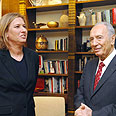
Livni with Peres
צילום: משה מילנר, לע"מ
What are Livni's options?
Following Shas' decision to stay out of coalition, Ynet reviews all possible political scenarios
The winter session of the 17th Israel Knesset, set to begin Monday, may be the last Knesset session of the current government. Following Shas' declaration Friday that the haredi party would not be joining a new coalition, Kadima Chairwoman Tzipi Livni has a number of options.
If she chooses to form a narrow government, she will be forced to rely on 29 Knesset members of Kadima, 19 members of the Labor Party, five members of Meretz and the Pensioners' Party (six members, plus one who has since formed his own faction) in order to reach the bare minimum of 60 MKs required to reach any kind of majority in the Knesset.
In order to have a "security net" of any sort, Livni will most likely need to rely on the Knesset's Arab factions.
Alternately, she could listen to some of her advisers and choose to go to early general elections. At this point, President Shimon Peres has the right to give another Knesset member 28 days to try and form a coalition. However, without Kadima's support for such a new coalition, this option seems likely to fail.
In the theoretical event that Peres decides to give another MK a chance at creating a coalition and that MK also fails, the president will then declare general elections to take place within 90 days.
At this point, the Knesset will take a pre-elections recess, making this Knesset's winter session the shortest in history.
MKs doing it for themselves
Knesset members themselves can try and influence the president. If 61 MKs (regardless of affiliation) formally announce to the president their support for one candidate for prime minister, the president can appeal to this MK to form a coalition government. The likelihood of this occurring is, however, small.A more reasonable possibility is the legislation of a law for quick dismissal of the Knesset, with the large parties coordinating a date for new elections between them. In such a case, elections will be held within five months of the legislation, giving parties more time to prepare for elections.
It is important to recall, when considering the current Israeli political situation, that it is possible that outgoing Prime Minister Ehud Olmert may be indicted, pursuant to a police recommendation.
In this case, Livni will take charge of the government as acting prime minister because she is technically Olmert's successor. Since this again gives her more time prior to elections, this is one favorable option as far as she is concerned.
It remains unclear who between Olmert and Livni will deliver the opening remarks for the 17th Knesset's winter session. Obviously, if Livni manages to create a coalition, she will deliver a speech as the prime minister. If not, it's yet another issue that is up in the air.










